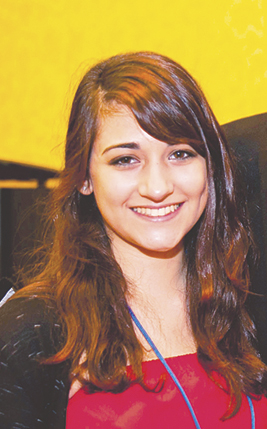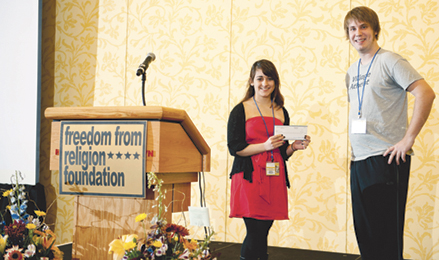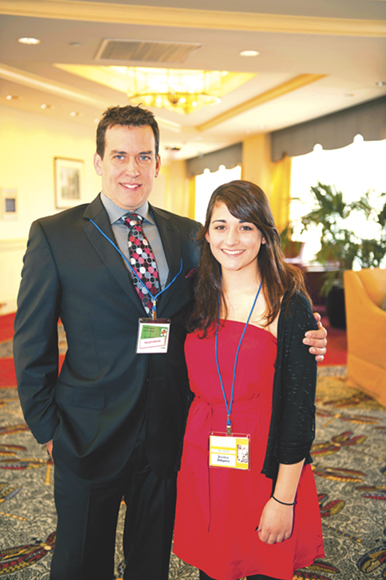 Jessica Ahlquist, 16, who is a plaintiff in an ACLU federal lawsuit to force removal of an 8-foot-tall prayer banner from her Rhode Island high school, spoke at FFRF’s 34th national convention Oct. 8, 2011, in Hartford, Conn., where she received the Thomas Jefferson Youth Activist Award of $1,000. This award is endowed by a West Coast couple. The painting was donated to Cranston West by the class of 1963, the first graduating class.
Jessica Ahlquist, 16, who is a plaintiff in an ACLU federal lawsuit to force removal of an 8-foot-tall prayer banner from her Rhode Island high school, spoke at FFRF’s 34th national convention Oct. 8, 2011, in Hartford, Conn., where she received the Thomas Jefferson Youth Activist Award of $1,000. This award is endowed by a West Coast couple. The painting was donated to Cranston West by the class of 1963, the first graduating class.
I’m a junior in high school at Cranston West, which is in Rhode Island. You don’t tend to think that Rhode Island is a very religious place. It usually has more of a secular connotation to it. However, I found out that wasn’t exactly true.
All of this started when I was a sophomore, but I first noticed the prayer when I was a freshman after a friend told me there was one on the wall in the auditorium. I was surprised to see it and didn’t think that my school would have something like that.
I’ve been an out-of-the-closet atheist only since this started. Before that, I didn’t want to talk about it. I didn’t really identify myself as an atheist to other people. It was really just something that I only told my family. I was afraid that I would lose a lot of my friends if I did come out, and that actually happened. I did lose some friends.
I went to a subcommittee meeting [of the School Committee of the city of Cranston] after a parent filed a formal complaint with the ACLU. I had been doing research on the prayer, on prayers in schools in general, and during that time over the summer, another parent kind of beat me to it and made a complaint. There were subcommittee meetings because the school didn’t want to just remove it right away.
My friend was a student representative on the subcommittee. I spoke at the meeting and identified myself as an atheist. When I did, someone gasped and someone else whispered under their breath that I was a “little witch.” [Jessica is 5 feet tall.] So I didn’t feel very welcome there, obviously, from the very beginning.
I attended another meeting, where there were a lot more people wearing signs around their necks that said, “Keep original banner.” They were pretty angry. I don’t think all of them knew why they were there though. Some of them seemed really confused. They just said, “Someone’s trying to destroy God,” and then they all jumped in a van or something.
A lot of irrelevant stuff came up at the meetings. People were talking about abortion and how prayers in schools somehow lowered the teen pregnancy rate. This was all coming from people who didn’t really know that the prayer mural existed before. I spoke at that meeting also and could feel how much people hated me. They stared and glared at me.
They were angry from the very start, and that was reflected at school. After it was on the news, weird things started happening. I would sneeze in class and people would scream, “God bless you!” in my face.
At the final meeting, the full committee voted to keep the prayer. The ACLU had contacted me, and I told them that I would become the plaintiff in a lawsuit. In April, we filed a lawsuit against the city of Cranston to take the prayer down.
In school the next day, I went into homeroom and people were already talking about it. They were saying that I was “mad, stupid” and things like that, so when we all rose to say the pledge, which I don’t say because “under God” doesn’t belong there, people at the appropriate time turned and yelled “under God!” at me. That was probably the first time that I realized the magnitude of what was happening.
People who had never talked to me before were judging me and calling me names, and it was really hurtful, I was really bothered by it. I went home crying that day.
It didn’t stop there. My friend and I were removed from school one day because there was a rumor going around that someone wanted to beat us up. A lot of rumors like that were going around for a long time. That was really scary because there had been some violence in my school recently.
Calling a prayer ‘history’
Despite all of this, I’ve started becoming much more open about my atheism and feeling a lot more confident saying that. In school it bothers me a lot, but I’m able to kind of put it aside and just get through my day. I do have days when I come home from school crying. Sometimes when I get off the bus, if I’m taking the bus that day, people drive past my house screaming things out the window.

Last year during Diversity Week at school, the Chinese-American mayor [Allan Fung, a Republican] of Cranston gave a talk about minorities, and said how even as a minority, he had succeeded and became mayor despite facing discrimination. During the Q&A, a student asked how he felt about the school prayer. He pointed to it (we were in the auditorium) and said, “I would like to see that prayer stay exactly where it is.”
Just about every single person stood up and cheered and clapped, applauding the mayor for basically being a complete hypocrite. I sat there and tried not to cry. It was really unexpected, not that I didn’t know what his opinion on it was. He had said on TV once that my family was just looking for money. (In case that comes up, we’re asking for $25. The legal advice was to do that, and I don’t want any money from this.)
I’m also not lying when I say that the banner is offensive. It’s entitled “School Prayer” and addresses “Our Heavenly Father” and ends with “Amen.” They’ve argued that it isn’t a prayer. They’ve argued that it’s historical. They’ve made every claim there is. But one claim that I don’t think they can fairly make is that I’m not offended by it. Because I am and other people are, too. Even Christians are. I have a Muslim friend who is.
They’re trying to keep the prayer in the school simply to push God on people who don’t want it pushed on them, and they’ve succeeded many times. In my school there are atheists who have told me that they disagree with what I’m doing. I’m always a little bit sad when I hear that, because it seems that they just haven’t really thought about it enough.
When I was younger, I didn’t necessarily see religion as something that needed to be fought all the time. But the more research I did, the more I learned that religion can be a big problem. That kind of inspired me to start fighting this prayer.
It’s been really hard, but I’m going to get through this, and hopefully when I do, the prayer will be removed. The court hearing for this case is Oct. 13, so unfortunately I don’t have a conclusion for you yet. I’ve been writing a lot about it and about the hate I’ve received and the things that are going on at school. [U.S. District Judge Ronald Rene Lagueux heard oral arguments Oct. 13 but hadn’t ruled as of press time.]
I’m trying to start a secular student group in my school. It was difficult finding a teacher sponsor. People don’t want to be associated with me. Teachers often just don’t really want to have any connection with me other than they’re my teacher. The same goes for students. But we did manage to find a teacher last week, and we’re really excited about that.
Q&A:
[Edited for space]Q: It doesn’t sound like you had any support from the faculty, and that sort of amazes me.
A: The support I’ve gotten has kind of been quiet, just between me and two faculty members. People are really nervous because it’s so controversial. They’re worried if they get involved they could possibly lose their jobs.
Q: [Comment] Unfortunately, you’re absolutely right about the faculty supporting you and receiving re-
tribution. My daughter started teaching in high school in Virginia and because she started a gay and lesbian support group, within a month she was told she would no longer be teaching advanced placement courses and could no longer serve on various committees and so on. She ended up going to law school and is now a very successful environmental lawyer.
Q: Do you think the stigma lessened or got worse after the initial shock? Are you now in a position to have even more influence on your school district as time goes on?
A: I’m hoping to. I think it got worse at first. It’s getting a little bit better now, but I think it’s going to start getting worse once there’s a result with the lawsuit. In the long run it could be better for me because I can start my secular club and maybe make atheists feel a little bit more open and welcome.
Q: Thinking of Roger Williams and the founding of Rhode Island, has this come up as a teachable moment in history class?
A: It’s kind of funny. In the first couple of weeks of my U.S. history class, the teacher said that when Roger Williams founded this state, he was trying to establish religious freedom. But she said, “Do you know the one group that nobody wanted in their state or in their area?” And she said, “Atheists.” Everyone in the class turned and stared at me.
Q: My son, a senior this year, is also an out atheist. I hope this reassures you, that as time went on, many people came up to support him who he never thought would. It’s been very good for him.
A: I’m a little surprised by who came forward, too, and who didn’t. There are kids I’ve gone to school with for years, and they’re only just now telling me that they’re atheists and support what I’m doing. That’s a great thing, because you do feel really alone.
Q: Do you have plans for college? What would you major in?
A: I don’t know where yet, but I have my heart set on writing.
Q: My husband’s an atheist. He’s scared to death to say anything at work, and he’s the boss. Have your parents felt any pressure at work or in the community?
A: I’m very lucky to have the support of my parents, mostly my dad. I think he’s had a couple of awkward moments at work, but other than that it’s been pretty good.
Q: I was in high school plays where they prayed before every play, which made me feel bad. But there was one girl who was also an atheist who helped me stand strong. Has there been someone like that for you?
A: Yes, my two best friends, who are in the school. When I first met them, they were religious but they aren’t any more.
Q: Throughout New England history, not-so-ancient New England history, Catholics were actually in favor of separation because of Yankee prayers in school. Rhode Island is probably the most Catholic state in the country. Have you received any support from Catholics?
A: Not many, and especially not openly. Some of them have sent me messages on Facebook saying, “Although I’m religious, I still think what you’re doing is the right thing.” When I went into this, I wanted to not make it a “religion versus atheism” kind of thing, but that’s what it’s become. I don’t know if that’s necessarily a bad thing. I think it’s shedding some light on something that needs it in Rhode Island.
Jessica Ahlquist, 16, is a junior and plaintiff in an ACLU federal lawsuit to remove religious imagery from Cranston High School West in Rhode Island.

Proud dad Mark Ahlquist posing with daughter, Jessica, 16.
